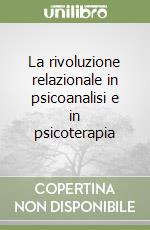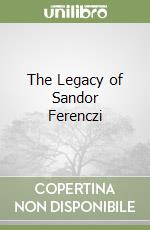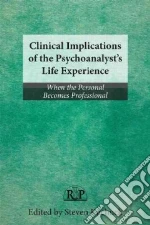 Libri di Steven Kuchuck su Unilibro.it
)
Libri di Steven Kuchuck su Unilibro.it
)
|
|
2023 |
 Title :
La rivoluzione relazionale in psicoanalisi e in psicoterapia
Title :
La rivoluzione relazionale in psicoanalisi e in psicoterapiaAuthor: Kuchuck Steven Publisher: Telesma Edizioni € 18,00
|
|
|
1915 |
 Title :
The Legacy of Sandor Ferenczi
Title :
The Legacy of Sandor FerencziAuthor: Harris Adrienne (EDT), Kuchuck Steven (EDT) Publisher: Routledge The Legacy of Sándor Ferenczi, first published in 1993 & edited by Lewis Aron & Adrienne Harris, was one of the first books to examine Ferenczi’s invaluable contributions to psychoanalysis and his continuing influence on contemporary clinicians and scholars. Building on that pioneering work, The Legacy of Sándor Ferenczi: From Ghost to Ancestorbrings together leading international Ferenczi scholars to report on previously unavailable data about Ferenczi and his professional descendants. Many—including Sigmund Freud himself—considered Sándor Ferenczi to be Freud’s most gifted patient and protégé. For a large part of his career, Ferenczi was almost as well known, influential, and sought after as a psychoanalyst, teacher and lecturer as Freud himself. Later, irreconcilable differences between Freud, his followers and Ferenzi meant that many of his writings were withheld from translation or otherwise stifled, and he was accused of being mentally ill and shunned. In this book,Harris and Kuchuck explore how newly discovered historical and theoretical material has returned Ferenczi to a place of theoretical legitimacy and prominence. His work continues to influence both psychoanalytic theory and practice, and covers many major contemporary psychoanalytic topics such as process, metapsychology, character structure, trauma, sexuality, and social and progressive aspects of psychoanalytic work. Among other historical and scholarly contributions, this book demonstrates the direct link between Ferenczi’s pioneering work and subsequent psychoanalytic innovations. With rich clinical vignettes, newly unearthed historical data, and contemporary theoretical explorations, it will be of great interest and use to clinicians of all theoretical stripes, as well as scholars and historians. Adrienne Harris, Ph.D. (Coeditor) is faculty and supervisor, NYU Postdoctoral Program in Psychotherapy and Psychoanalysis, Faculty and Training Analyst at the Psychoanalytic Institute of Northern California, serves on the Editorial Boards ofPsychoanalytic Dialogues, Studies in Gender and Sexuality, Psychoanalytic Perspectives and theJournal of the American Psychoanalytic Association. Coeditor, Routledge’s Relational Perspectives Book Series. Steven Kuchuck, LCSW (coeditor) is a faculty member, supervisor, Board member, and co-director of curriculum for the adult training program in psychoanalysis at the National Institute for the Psychotherapies and faculty, Stephen Mitchell Center for Relational Studies. Steven is Editor-in-Chief of Psychoanalytic Perspectives, and Associate Editor of Routledge’s Relational Perspectives Book Series.
€ 47,90
|
 Title :
The Legacy of Sandor Ferenczi
Title :
The Legacy of Sandor FerencziAuthor: Harris Adrienne (EDT), Kuchuck Steven (EDT) Publisher: Routledge The Legacy of Sándor Ferenczi, first published in 1993, was one of the first books to examine Ferenczi’s invaluable contributions to psychoanalysis and his continuing influence on contemporary clinicians and scholars. Building on that pioneering work,The Legacy of Sándor Ferenczi: From Ghost to Ancestor brings together leading international Ferenczi scholars to report on previously unavailable data about Ferenczi and his professional descendants. Many—including Sigmund Freud himself—considered Sándor Ferenczi to be Freud’s most gifted patient and protégé. For a large part of his career, Ferenczi was almost as well known, influential, and sought after as a psychoanalyst, teacher and lecturer as Freud himself. Later, irreconcilable differences between Freud, his followers and Ferenzi meant that many of his writings were withheld from translation or otherwise stifled, and he was accused of being mentally ill and shunned. In this book,Harris and Kuchuck explore how newly discovered historical and theoretical material has returned Ferenczi to a place of theoretical legitimacy and prominence. His work continues to influence both psychoanalytic theory and practice, and covers many major contemporary psychoanalytic topics such as process, metapsychology, character structure, trauma, sexuality, and social and progressive aspects of psychoanalytic work. Among other historical and scholarly contributions, this book demonstrates the direct link between Ferenczi’s pioneering work and subsequent psychoanalytic innovations. With rich clinical vignettes, newly unearthed historical data, and contemporary theoretical explorations, it will be of great interest and use to clinicians of all theoretical stripes, as well as scholars and historians. Adrienne Harris, Ph.D. (Coeditor) is faculty and supervisor, NYU Postdoctoral Program in Psychotherapy and Psychoanalysis, Faculty and Training Analyst at the Psychoanalytic Institute of Northern California, serves on the Editorial Boards ofPsychoanalytic Dialogues, Studies in Gender and Sexuality, Psychoanalytic Perspectives and theJournal of the American Psychoanalytic Association. Coeditor, Routledge’s Relational Perspectives Book Series. Steven Kuchuck, LCSW (coeditor) is a faculty member, supervisor, Board member, and co-director of curriculum for the adult training program in psychoanalysis at the National Institute for the Psychotherapies and faculty, Stephen Mitchell Center for Relational Studies. Steven is Editor-in-Chief of Psychoanalytic Perspectives, and Associate Editor of Routledge’s Relational Perspectives Book Series.
€ 191,70
|
|
1913 |
 Title :
Clinical Implications of the Psychoanalyst's Life Experience
Title :
Clinical Implications of the Psychoanalyst's Life ExperienceAuthor: Kuchuck Steven (EDT) Publisher: Routledge Clinical Implications of the Psychoanalyst’s Life Experience explores how leaders in the fields of psychoanalysis and psychotherapy address the phenomena of the psychoanalyst’s personal life and psychology. In this edited book, each author describes pivotal childhood and adult life events and crises that have contributed to personality formation, personal and professional functioning, choices of theoretical positions, and clinical technique. By expanding psychoanalytic study beyond clinical theory and technique to include a more careful examination of the psychoanalyst’s life events and other subjective phenomena, readers will have an opportunity to focus on specific ways in which these events and crises affect the tenor of the therapist’s presence in the consulting room, and how these occurrences affect clinical choices. Chapters cover a broad range of topics including illness, adoption, sexual identity and experience, trauma, surviving the death of one’s own analyst, working during 9/11, cross cultural issues, growing up in a communist household, and other family dynamics. Throughout, Steven Kuchuck (ed) shows how contemporary psychoanalysis teaches that it is only by acknowledging the therapist’s life experience and resulting psychological makeup that analysts can be most effective in helping their patients. However, to date, few articles and fewer books have been entirely devoted to this topic. Clinical Implications of the Psychoanalyst’s Life Experience forges new ground in exploring these under-researched areas. It will be essential reading for practicing psychoanalysts, psychotherapists, psychologists, social workers, those working in other mental health fields and graduate students alike. € 48,20
|